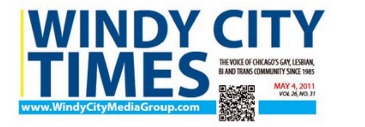Howard Brown Boycotts the Windy City Times
By Tony Peregrin in News on Nov 3, 2011 2:00PM
 You won’t find a copy of the Windy City Times at Howard Brown Health Center (HBHC) or any of the organization’s venues, including the Brown Elephant resale shops, Triad, the Broadway Youth Center and other locations beginning this week because the agency is boycotting the publication.
You won’t find a copy of the Windy City Times at Howard Brown Health Center (HBHC) or any of the organization’s venues, including the Brown Elephant resale shops, Triad, the Broadway Youth Center and other locations beginning this week because the agency is boycotting the publication.
This action by HBHC—one of the Midwest’s largest providers of health care services to the LGBT community—is in direct response to what HBHC President and CEO Jamal M. Edwards calls “a pattern and practice of [WCT] publishing information that is inaccurate, misleading and, ultimately harmful to our patients.”
In an e-mail sent to WCT publisher Tracy Baim and managing editor Andrew Davis on Oct. 28, Edwards announced his agency would no longer accept or distribute the WCT at any of the HBHC sites due to what he perceives as biased coverage of the organization. “Except for the WCT, nearly all press has been fair and balanced and have accurately and timely reported newsworthy information about HBHC,” noted Edwards.
HBHC has had some challenges over the past two years. In 2010, HBHC announced that they were in a financial crisis, following an alleged mismanagement of funds and, shortly after that, the agency announced an overhaul of the board in an apparent effort to appease frustrated community members.
Edwards cited a recent WCT’s story (10/26/2011), on the agency’s loss of funding from the U.S. Centers for Disease Control for trans-feminine youth as the latest example of what he calls inaccurate reporting by the media group. According to the WCT story, “there will be no trans-specific youth services funded at HBHC by the end of the year, unless the Trans Youth Resource Advocacy (TYRA) grant is renewed by the Chicago Department of Public Health.” Edwards claims this is false, and that HBHC will continue to “offer many trans-specific services” and that the TYRA program is “not in jeopardy.”
Windy City Times revealed HBHC’s intention to no longer distribute the publication in this week’s issue. The brief announcement included the following statement:
On WCT’s website, the editors compiled links to the paper’s recent coverage of HBHC, in effect, giving readers a chance to evaluate the publication’s comprehensive coverage of the organization.
Chicagoist reached out to both Baim and HBHC to comment on the boycott, and on the future relationship between the media outlet and the health care services agency. The HBHC responded to our requests by forwarding the e-mail the agency sent to Baim and Davis, along with the following statement:
“On behalf of Howard Brown Health Center, we want to share the initial e-mail sent to the Windy City Times to provide additional clarity about how we came to discontinue the availability of the publication at our locations. We continue to share information with the publication along with all other news outlets.”
Baim responded to Chicagoist's interview request via e-mail. The following Q&A was edited for length and clarity.
Chicagoist: How did you first learn that HBHC would no longer distribute the Windy City Times at any of its locations?
Tracy Baim: We received an e-mail last Friday from HBHC CEO Jamal Edwards, sent to managing editor Andrew Davis and myself. Their letter said it was because of our coverage of HBHC. We did not respond to the letter. We told our drivers this week to stop delivering and [to] adjust those papers to nearby locations.
Chicagoist: How many issues of the paper will this boycott effect?
Tracy Baim: It was only about 300 papers in all, and we simply moved them to places within the same area of those locations (for example, news boxes and the Center on Halsted).
Chicagoist: Talk about why you think Windy City Times’ articles on HBHC are the result of sound, unbiased reporting.
Tracy Baim: We have spent more than a year tracking down rumors, facts, personal stories, etc., on HBHC. It has been a very difficult story to cover, hampered in part by the difficulty in getting the full story of what is happening there. Our reporters have tried very hard to speak to as many sources as possible for every story, and we have never rushed anything into print. Some stories took two or more months to develop. Many employees are very scared for their jobs, and will only speak in-person at very private meetings. This means part of our job is building trust with very scared sources. In addition, officials there have not answered questions, and the board president has turned down numerous requests to be interviewed. I must say that parallel to this, we have also covered events and benefits HBHC has had, including their recent LCCP Garden of Eve event, which we also sponsored with advertisements.
Chicagoist: Are you surprised by HBHC's boycott?
Tracy Baim: I am not surprised. Over the past two decades, the agency has had many ups and downs in terms of transparency and leadership. This recent set of problems is part of a systemic problem that seems to have no easy answers. There are more issues to come—ones we are still working on.
Disclosure: Chicagoist general contributor Tony Peregrin is also a writer for the Windy City Times.